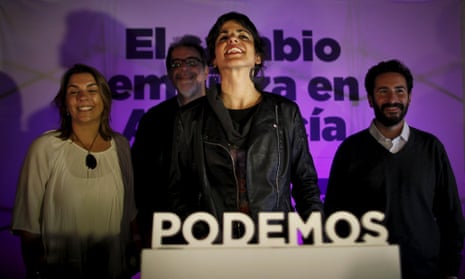Podemos, the Spanish anti-austerity party, will be a prominent force in Andalusia’s regional parliament after it won 15 seats in the party’s first election since its ally Syriza triumphed in Greece.
The Socialists, who have held power in Andalusia for more than three decades, will continue to govern the region. Lead by Susana Díaz, they won 35% percent of the vote, earning them 47 seats, shy of an outright majority.
“Andalusians have made their voices heard through the ballot box,” Díaz, 40, said on Sunday as the results came in.
The election held up Spain’s two-party system, albeit in a weakened state. The People’s party came in second with 27% of the vote, or 33 seats, but the party of prime minister Mariano Rajoy was the biggest loser on the day as the result was a steep drop from the 50 seats it won in the 2012 elections.
The Andalusian election generated considerable interest far outside the region’s boundaries. Spain this year will see municipal, regional and general elections across the country and many saw the Andalusian race as a crucial window into electoral sentiment.
The race was also Podemos’s first test since Syriza’s win in the Greek elections. With Andalusia’s unemployment rate sitting at 34% – the highest in Spain – and the Socialists entangled in allegations of misusing hundreds of millions of euros in public funds, the election was widely seen as one of Podemos’s first runs at turning discontent into votes.
On Sunday, the party touted their results as the first step in a change sweeping Spain. “The change has begun and will continue,” Podemos candidate Teresa Rodríguez said.
Podemos’s supporters had previously downplayed their chances in Andalusia, pointing to voters’ unwavering support of the regional Socialist party. But in one corner of Spain, Podemos exceeded all expectations: Cádiz. Home to Rodríguez and where the unemployment rate exceeds that of Greece, Podemos placed first in this city, earning 29% of the vote.
The Andalusian ballot showed the willingness of Spaniards to test out new parties, said José Ignacio Torreblanca, a political analyst who is writing a book on Podemos. Together with upstart centre-right party Ciudadanos, Podemos earned nearly a quarter of the vote.
Now the rest of Spain will be watching Andalusia closely to see how Podemos carries out its promises to reverse the pains of austerity, he said. “Now it gets real for them. They have to live up to the rhetoric, big speeches and all these big general ideas about the crisis and inequality.”
Podemos’s 15 seats could put them in a prime position of influence over the Socialists, who came eight seats short of a majority. With the Socialists on the hunt for coalition partners, be it formal or on an ad-hoc basis, Podemos now faces a unique dilemma.
Any alliance with the Socialists could dilute Podemos’s message of change, while an outright refusal to forge alliances could destabilise the regional parliament and lend credibility to opposition claims that a vote for Podemos is a vote for instability. “It’s going to be tough for them to show that they’re in the opposition but to show that they’re not a threat to the system,” said Torreblanca.
Ciudadanos, who won nine seats in their first Andalusian election, will also be a key target for alliances. On Sunday, the party saw interpreted their position in parliament as an attack by voters on Spain’s bipartisan political system. “There may be people who will read the news tomorrow and think they’ve won,” said Albert Rivera, leader of Ciudadanos. “But we all know the two-party system has died.”
The real test for Spain’s bipartisan system will come as the Andalusian parliament begins with Podemos and Ciudadanos thrown into the mix, said Torreblanca. “With these results they’re not powerful enough to overthrow the system, but they’re powerful enough to change the system. They’re going to introduce a new sort of dynamism, more accountability and more transparency.”





Comments (…)
Sign in or create your Guardian account to join the discussion